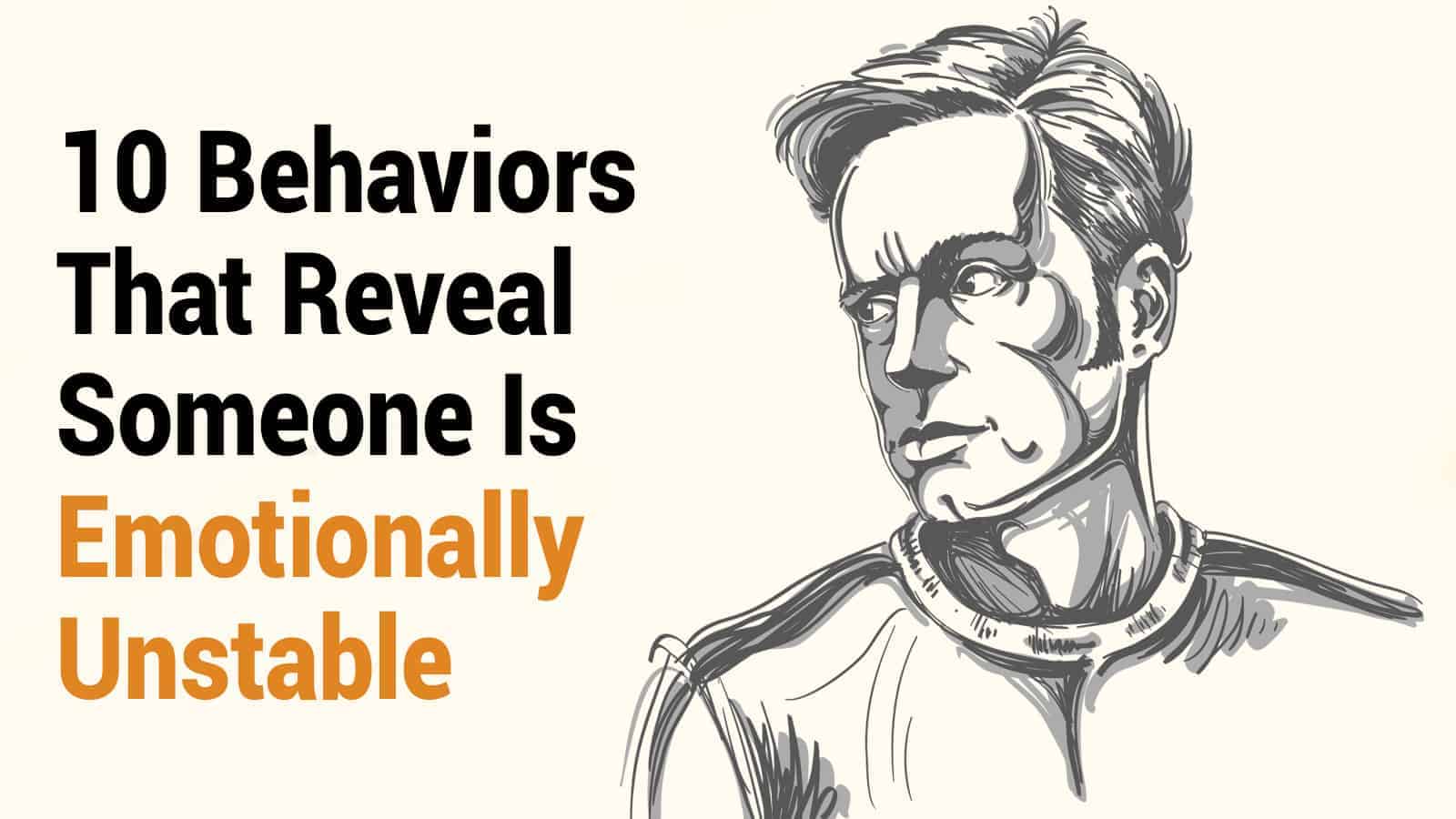Being emotionally unstable makes life feel like a constant rollercoaster ride. These types of people probably don’t want to feel so many fluctuating emotions and would love to get off the ride, but just don’t know how. Emotional instability may happen due to certain life events, or childhood trauma or abuse may trigger it.
Sometimes, a person may develop Borderline Personality Disorder (BPD), or Emotionally Unstable Personality Disorder (EUPD). According to the National Alliance on Mental Illness, around 1.4% of the U.S. population has BPD, and 75% of people diagnosed with it are women. People with BPD have difficulty regulating emotions and may fluctuate between intense moods for hours or days at a time.
“Your emotions are very unstable and should never be the foundation for direction in your life.” – Joyce Me
The following symptoms characterize BPD according to the DSM-5:
Do you see any of these behaviors?
- Frantic efforts to avoid real or imagined abandonment by friends and family.
- Unstable personal relationships that alternate between idealization (“I’m so in love!”) and devaluation (“I hate her”). This is also sometimes known as “splitting.”
- Distorted and unstable self-image affects moods, values, opinions, goals, and relationships.
- Impulsive behaviors that can have dangerous outcomes, such as excessive spending, unsafe sex, reckless driving, or misuse, or overuse of substances.
- Self-harming behavior including suicidal threats or attempts.
- Periods of intense depressed mood, irritability, or anxiety lasting a few hours to a few days.
- Chronic feelings of boredom or emptiness.
- Inappropriate, intense, or uncontrollable anger—often followed by shame and guilt.
- Dissociative feelings—disconnecting from your thoughts or sense of identity or “out of body” type of feelings—and stress-related paranoid thoughts. Severe cases of stress can also lead to brief psychotic episodes.
Even if someone doesn’t have a disorder, they may still appear emotionally unstable and exhibit certain traits. If someone shows the following behaviors, they may struggle with their mental health and have difficulty controlling their emotions.
Here are ten behaviors that reveal someone is emotionally unstable:
1 – An emotionally unstable person may have random outbursts of anger
Emotionally unstable people may get angry over insignificant or trivial things. You may feel you have to walk on eggshells around them because you never know what may set them off. A person with anger may fluctuate between being perfectly pleasant and snapping for no apparent reason. This makes relationships with others very difficult, as the person never knows what to expect.
They may shout and scream or even become violent depending on the intensity of the anger. However, if you feel in danger around this person, please seek help from trusted family members or the national domestic violence hotline.
2 – Impulsive behaviors are frequent in emotionally unstable people
People with emotionally unstable personalities may have inclinations toward impulsive, reckless behaviors. Common impulsive behaviors may include:
- reckless driving
- compulsive shopping sprees
- unsafe sex
- substance abuse
- gambling
- self-harm
These types of behaviors can indicate various mental health disorders, such as BPD, bipolar disorder, depression, or anxiety. Most of the time, the person feels they can’t control their behavior and feel compelled to engage in reckless activities as either an escape or to get a “high” feeling. Afterward, they may not even remember these activities if they experienced a psychotic episode which can cause dissociative feelings.
Some people use impulsive behaviors to regulate their emotions, which seems counterintuitive. However, the intense stimulation they receive from these activities serves as a temporary escape from troubling emotions.
3 – Unstable relationships with family and friends
As you can imagine, an emotionally unstable person will have extreme difficulty maintaining relationships. They may fluctuate between loving and hating friends and family, and even the smallest disagreements may change their opinion of them. They may feel codependent on people closest to them, so they can become very upset when someone doesn’t uphold the image they created for them. Just as they put people on a pedestal, they may give the silent treatment or express extreme anger when someone hurts them.
4 – Difficulty holding jobs
Another indicator of a mental health problem, switching between jobs often can wreak havoc on a person’s life. Of course, everyone gets tired of certain jobs or careers and may realize they want something else after a certain time. However, being unable to hold jobs for six months may indicate a deeper issue. Job hopping may mean that the person struggles with their self-image and changes jobs according to their temporary perception of themselves.
5 – Overreactions to everything
A person with emotional instability will have extreme reactions to even small things, such as their partner forgetting to pay a bill or staying out too late the night before for a company dinner. They may make assumptions about how situations played out and react before allowing the other party to explain things. Everything feels like the end of the world to them, and they don’t know how to turn the dial back just a little bit.
They display extreme emotions as a coping mechanism because they have difficulty dealing with stress or difficult situations. They may have had turbulent childhoods or traumatic events happen at a young age, contributing to their mental health issues.
6 – Identity issues
As we stated above, people with difficulties regulating emotions will struggle with their self-image. They may take on the personality of those around them, also called mimicking, to fit in or give themselves an idea of how to act. Because they shift rapidly between opinions, values, ideals, and personality traits, they can act like chameleons and blend in any crowd. If you notice someone drastically changing their personality or looks around different people, they may be emotionally unstable.
7 – Emotionally unstable people may have low self-esteem
Another trait of someone with a mental health condition is poor self-worth. They may not show it, but deep down they don’t feel good enough. Sometimes this presents as being an underachiever, as the person feels like they don’t have what it takes to get a stable job. They may work menial jobs in fast food or other low paying industries because they have low self-esteem. Or, they may choose partners they don’t love because they don’t feel they can do any better.
Another sign of low self-esteem is acting out or becoming overly defensive when someone criticizes them. They may secretly agree with the person, but don’t want to admit it.
8 – Inability to cope with stress
Emotionally unstable people have a tough time dealing with all life’s stressors. As we said before, this may cause them to underperform and choose a life where they barely scrape by. They may avoid the stress by either not working, working odd jobs, or getting involved in dangerous habits such as drugs or alcohol to cope. An emotionally unstable person believes they can’t have a normal life, so they don’t want to try.
9 – An emotionally unstable persom might avoid responsibilities
Someone with a severe mental health condition may not take on responsibilities as an adult. They may never move out, miss payments on bills or disregard opportunities to advance in life. They often latch onto others because they don’t feel they can care for themselves. If people enable them and don’t force them to become independent, they may never learn to take care of themselves despite their illness. Therapy can greatly help a person who’s emotionally unstable to regulate their emotions and have a normal life.
10 – Very sensitive to criticism
Another trait of someone with difficulty regulating emotions is being overly sensitive to criticism. They may cry, become angry, or resort to passive-aggressive behaviors if someone offers constructive criticism either at work or in personal relationships. They have a fragile sense of self, so any critiques made to their ego really damage their self-esteem. People may feel like they must tiptoe around them to avoid outbursts or overreactions.
Final thoughts on behaviors that reveal someone is emotionally unstable
A person who tends to be emotionally unstable will often have a turbulent sense of self, trouble with relationships, and difficulties holding down jobs. They show extreme sensitivity to criticism, an inability to deal with life’s stress, and often avoid adult responsibilities. They also struggle with low self-esteem, impulsive behaviors, and random outbursts of anger.
If you have someone with a mental health condition like this or suffer from one yourself, you know how overwhelming it can seem. Mental illness can easily overtake someone’s life if they don’t get the right treatment and support. However, therapy, medication, and lifestyle changes can make a huge difference. Mental illness is nothing to be ashamed of because most people struggle with it at some point during their lifetime. Make sure to ask for help if you feel overwhelmed by your symptoms because there are people out there who want to help you. It’s never too late to get treatment for a mental health condition.



















